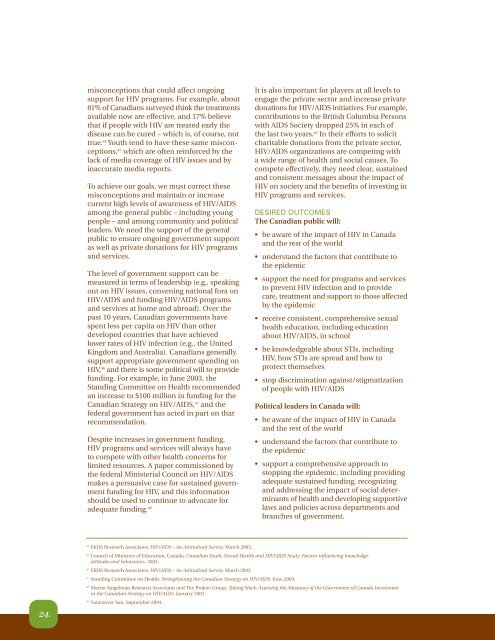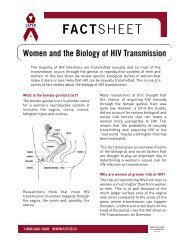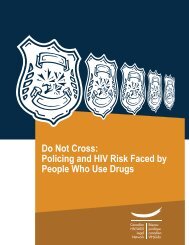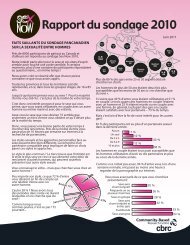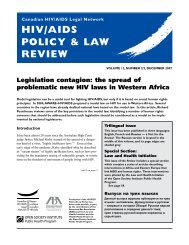leadingtogether: - CATIE
leadingtogether: - CATIE
leadingtogether: - CATIE
- No tags were found...
You also want an ePaper? Increase the reach of your titles
YUMPU automatically turns print PDFs into web optimized ePapers that Google loves.
misconceptions that could affect ongoingsupport for HIV programs. For example, about81% of Canadians surveyed think the treatmentsavailable now are effective, and 17% believethat if people with HIV are treated early thedisease can be cured – which is, of course, nottrue. 44 Youth tend to have these same misconceptions,45 which are often reinforced by thelack of media coverage of HIV issues and byinaccurate media reports.To achieve our goals, we must correct thesemisconceptions and maintain or increasecurrent high levels of awareness of HIV/AIDSamong the general public – including youngpeople – and among community and politicalleaders. We need the support of the generalpublic to ensure ongoing government supportas well as private donations for HIV programsand services.The level of government support can bemeasured in terms of leadership (e.g., speakingout on HIV issues, convening national fora onHIV/AIDS and funding HIV/AIDS programsand services at home and abroad). Over thepast 10 years, Canadian governments havespent less per capita on HIV than otherdeveloped countries that have achievedlower rates of HIV infection (e.g., the UnitedKingdom and Australia). Canadians generallysupport appropriate government spending onHIV, 46 and there is some political will to providefunding. For example, in June 2003, theStanding Committee on Health recommendedan increase to $100 million in funding for theCanadian Strategy on HIV/AIDS, 47 and thefederal government has acted in part on thatrecommendation.Despite increases in government funding,HIV programs and services will always haveto compete with other health concerns forlimited resources. A paper commissioned bythe federal Ministerial Council on HIV/AIDSmakes a persuasive case for sustained governmentfunding for HIV, and this informationshould be used to continue to advocate foradequate funding. 48It is also important for players at all levels toengage the private sector and increase privatedonations for HIV/AIDS initiatives. For example,contributions to the British Columbia Personswith AIDS Society dropped 25% in each ofthe last two years. 49 In their efforts to solicitcharitable donations from the private sector,HIV/AIDS organizations are competing witha wide range of health and social causes. Tocompete effectively, they need clear, sustainedand consistent messages about the impact ofHIV on society and the benefits of investing inHIV programs and services.DESIRED OUTCOMESThe Canadian public will:• be aware of the impact of HIV in Canadaand the rest of the world• understand the factors that contribute tothe epidemic• support the need for programs and servicesto prevent HIV infection and to providecare, treatment and support to those affectedby the epidemic• receive consistent, comprehensive sexualhealth education, including educationabout HIV/AIDS, in school• be knowledgeable about STIs, includingHIV, how STIs are spread and how toprotect themselves• stop discrimination against/stigmatizationof people with HIV/AIDSPolitical leaders in Canada will:• be aware of the impact of HIV in Canadaand the rest of the world• understand the factors that contribute tothe epidemic• support a comprehensive approach tostopping the epidemic, including providingadequate sustained funding, recognizingand addressing the impact of social determinantsof health and developing supportivelaws and policies across departments andbranches of government.44EKOS Research Associates. HIV/AIDS – An Attitudinal Survey. March 2003.45Council of Ministers of Education, Canada. Canadian Youth, Sexual Health and HIV/AIDS Study: Factors influencing knowledge,attitudes and behaviours. 2003.46EKOS Research Associates. HIV/AIDS – An Attitudinal Survey. March 2003.47Standing Committee on Health. Strengthening the Canadian Strategy on HIV/AIDS. June 2003.24.48Martin Spigelman Research Associates and The Project Group. Taking Stock: Assessing the Adequacy of the Government of Canada Investmentin the Canadian Strategy on HIV/AIDS. January 2001.49Vancouver Sun. September 2004.


